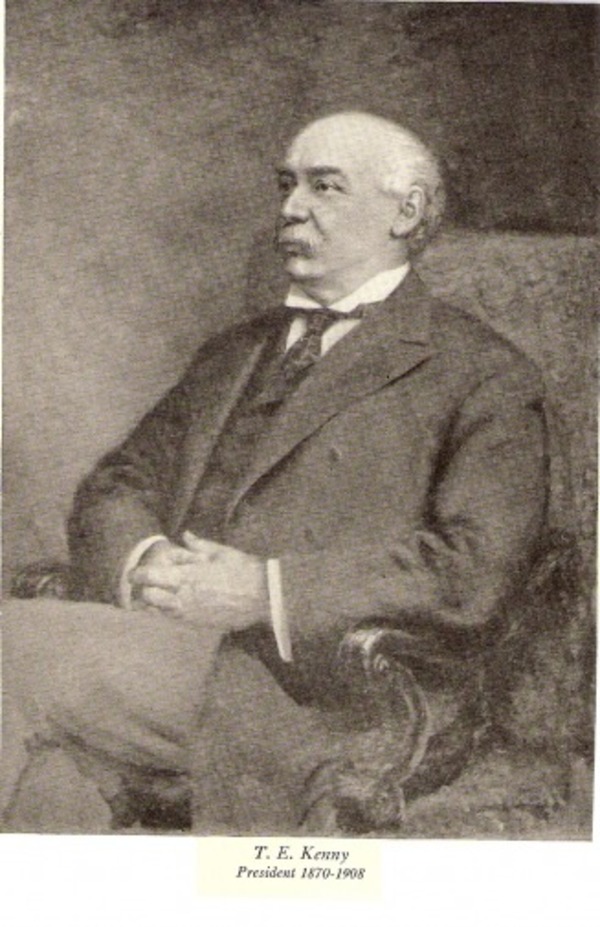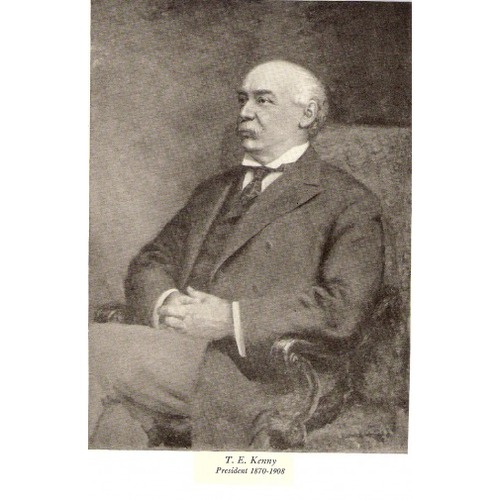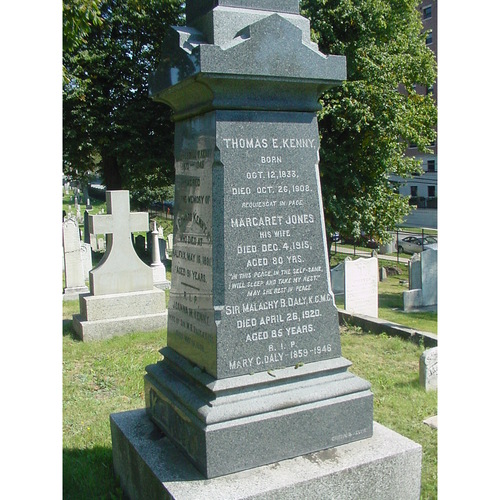
Source: Link
KENNY, THOMAS EDWARD, businessman and politician; b. 12 Oct. 1833 in Halifax, eldest son of Edward Kenny* and Ann Forrestall; m. 2 Oct. 1856, in New York City, Margaret Jones Burke (Bourke), daughter of Michael Burke (Bourke), and they had 13 children; d. 26 Oct. 1908 in Halifax.
Thomas Kenny grew up in the household of the richest and most powerful of Halifax’s Irish Catholic merchants. Educated at Stonyhurst College in England and the Collège Saint-Servais in Liège, Belgium, he returned home in the mid 1850s to enter his family’s wholesale dry-goods and shipping business. Apparently in charge of the firm from about 1870 and senior partner after his father retired in 1876, Kenny headed an enterprise with assets of one million dollars. By the mid 1870s he was also part-owner of 18 vessels, in which he had invested at least $100,000, enough to make him “one of the largest . . . shipowners in [Halifax].” Confronted later that decade by shrinking profits in high-seas commerce as freight rates fell off precipitously with the decline of the world economy, Kenny began to sell off his vessels and used the capital to move into manufacturing, most notably during the early 1880s. He played a key role in establishing the Nova Scotia Sugar Refinery Limited and the Nova Scotia Cotton Manufacturing Company in the provincial capital, becoming a shareholder and director in both companies and eventually chairman of the board of the latter organization. Despite his involvement in shipping and manufacturing, however, Kenny remained primarily a dry-goods wholesaler.
Kenny was the son of a sometime senator and federal cabinet minister, and he continued the family presence in federal politics. A pro-confederate and advocate of Sir John A. Macdonald*’s National Policy, in 1887 he reluctantly entered federal politics and was elected a Conservative mp for Halifax in succession to his brother-in-law Malachy Bowes Daly. At Ottawa he generally restricted his comments to issues of immediate interest to Halifax, such as the improvement of the terminal facilities of the Intercolonial Railway and the introduction of a modern steamship service linking Nova Scotia to Europe. These measures, local businessmen thought, would establish Halifax as Canada’s leading winter port, a position sought with increasing desperation as the city sank ever further into economic decay. Kenny’s efforts as a politician were largely futile and fostered disillusionment, which perhaps explains his refusal to enter the federal cabinet when offered a position following the death of fellow Haligonian Sir John Sparrow David Thompson* in 1894. In the election of 1896 he won the urban vote in his constituency but lost his seat thanks to strong rural dissatisfaction engendered by a quarter-century of distress and depopulation.
Despite sustained battles with political foes such as Alfred Gilpin Jones, Kenny had remained popular in business circles because of his wealth and geniality. He served for years on Halifax’s Chamber of Commerce and helped to found new enterprises such as the Eastern Trust Company. From 1870 Kenny’s power and prestige derived primarily from his presidency of the Merchants’ Bank of Halifax, the city’s largest financial institution, which his father had helped to found and in which the bulk of his own money was invested. Early in his tenure the bank embarked on a program of establishing branches throughout the Maritimes. Then in the mid 1880s, in reaction to a wave of business failures in the region, Kenny opted for a policy of expansion across Canada and into the Caribbean [see David Hunter Duncan]. By the turn of the century, the bank was raising much of the capital it needed for growth from sources outside Halifax. As a result, the head office of the now renamed Royal Bank of Canada was moved to Montreal in 1907. Kenny remained president until his death, but real power in the bank had shifted to central Canadian entrepreneurs led by Herbert Samuel Holt*, who was to be Kenny’s successor.
When Kenny died the Halifax press hailed him as a business giant, renowned for his “dignity, grace and hospitality.” He left a fortune of over $430,000, virtually all of which went to his wife and children. Most of the latter lived abroad and had eschewed business for association with the imperial military establishment. Thus the death of Thomas Kenny was doubly the end of an era. His passing terminated the Kenny presence within Halifax’s business élite and it also ended all semblance of Nova Scotian control over the Royal Bank, an institution destined to become a pillar of the Canadian financial world.
Baker Library, R. G. Dun & Co. credit ledger, Canada, 12: 706, 770 (mfm. at NA). Halifax County Court of Probate (Halifax), Estate papers, no.6703. Daily Echo (Halifax), 26, 28 Oct. 1908. Evening Mail (Halifax), 26, 28 Oct. 1908. Maritime Merchant (Sackville, N.B., and Halifax), 12 Nov. 1908. Morning Chronicle (Halifax), 4 Dec. 1880, May–June 1896. Morning Herald (Halifax), 28 Jan., 3 Feb. 1887; 10 Feb. 1891. Almanac, Belcher’s, 1860–1900. Annual financial rev. (Toronto and Montreal), 1 (1901)–9 (1909). Can., House of Commons, Debates, 1887–96. Canadian men and women of the time (Morgan; 1898). Cyclopædia of Canadian biog. (Rose and Charlesworth), vol.2. Royal Bank of Canada, Fiftieth anniversary of the Royal Bank of Canada . . . 1869–1919 (Montreal, 1920).
Cite This Article
David A. Sutherland, “KENNY, THOMAS EDWARD,” in Dictionary of Canadian Biography, vol. 13, University of Toronto/Université Laval, 2003–, accessed September 18, 2024, https://www.biographi.ca/en/bio/kenny_thomas_edward_13E.html.
The citation above shows the format for footnotes and endnotes according to the Chicago manual of style (16th edition). Information to be used in other citation formats:
| Permalink: | https://www.biographi.ca/en/bio/kenny_thomas_edward_13E.html |
| Author of Article: | David A. Sutherland |
| Title of Article: | KENNY, THOMAS EDWARD |
| Publication Name: | Dictionary of Canadian Biography, vol. 13 |
| Publisher: | University of Toronto/Université Laval |
| Year of publication: | 1994 |
| Year of revision: | 1994 |
| Access Date: | September 18, 2024 |




